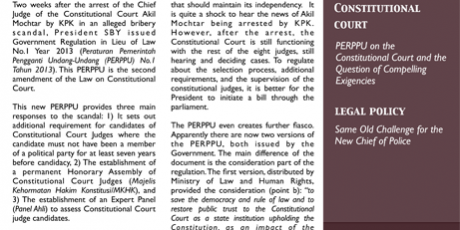Constitutional Court
PERPPU on the Constitutional Court and the Question of Compelling Exigencies
Two weeks after the arrest of the Chief Judge of the Constitutional Court Akil Mochtar by KPK in an alleged bribery scandal, President SBY issued Government Regulation in Lieu of Law No.1 Year 2013 (Peraturan Pemerintah Pengganti Undang-Undang (PERPPU) No.1 Tahun 2013). This PERPPU is the second amendment of the Law on Constitutional Court.
This new PERPPU provides three main responses to the scandal: 1) It sets out additional requirement for candidates of Constitutional Court Judges where the candidate must not have been a member of a political party for at least seven years before candidacy, 2) The establishment of a permanent Honorary Assembly of Constitutional Court Judges (Majelis Kehormatan Hakim Konstitusi/MKHK), and 3) The establishment of an Expert Panel (Panel Ahli) to assess Constitutional Court judge candidates.
PERPPU is a regulation enacted unilaterally by the President, which has the same validity as a law. Article 22 (1) of the 1945 Constitution stated that the President has the right to issue PERPPU should exigencies compel. The PERPPU must obtain approval from the DPR in the next parliamentary session. If such approval is not granted, the PERPPU shall be revoked.
Yes, it is the President’s constitutional right and it set up as a subjective right of the President. However, it is also important for the public to question and criticize the President’s sense of urgency. Such constitutional right should be use carefully, only when exigencies compel. Moreover, in this case, this PERPPU is related to the judiciary branch of power that should maintain its independency. It is quite a shock to hear the news of Akil Mochtar being arrested by KPK. However, after the arrest, the Constitutional Court is still functioning with the rest of the eight judges, still hearing and deciding cases. To regulate about the selection process, additional requirements, and the supervision of the constitutional judges, it is better for the President to initiate a bill through the parliament.
The PERPPU even creates further fiasco. Apparently there are now two versions of the PERPPU, both issued by the Government. The main difference of the document is the consideration part of the regulation. The first version, distributed by Ministry of Law and Human Rights, provided the consideration (point b): “to save the democracy and rule of law and to restore public trust to the Constitutional Court as a state institution upholding the Constitution, as an impact of the deterioration of the integrity and personality of the constitutional judge, then it is needed to conduct the second amendment of Law Number 24 Year 2003 on the Constitutional Court”. In the second version, previously published on the website of the Cabinet Secretariat, now no longer available, the part of “as an impact of the deterioration of the integrity and personality of the constitutional judge” do not exist in the document. Prof. Saldi Isra of University of Andalas stated that the first version had wording that demean the Constitutional Court judges.
It seems that on the day of October 17th 2013, the compelling exigencies are very real for the Government. So real that the Government cannot be very clear on the reason why the urgency is urgent. (EN)
Legal Policy
Same Old Challenge for the New Chief of Police
Commissioner-General Sutarman has been elected as the Republic of Indonesia’s Chief of Police who will replace Police General Timur Pradopo. The public is in high hopes that the new Chief of Police should bring changes in the image and face of the Indonesian National Police towards society, becoming humane and unreserved law enforcement officers. Sutarman has promised to bring forth changes. The National Police Commission (Komisi Kepolisian Nasional/Kompolnas) has recorded at least three pledges regarding improvements in the Indonesian National Police. First, Sutarman pledges to revamp several issues that have occurred internally. Second, he pledges to improve police performance in handling corruption cases. Third, he pledges to be neutral in the upcoming General Election.
Related to performance improvements in handling corruption cases, Sutarman has pledged to establish a special anti-corruption detachment. The discourse on its establishment has potential to cause overlapping in the handling of corruption cases by the Indonesian National Police. Currently, the Indonesian National Police have a Directorate of Corruption Criminal Acts who is under the Indonesian National Police Criminal Investigation Division. The need to establish this division does not seem urgent seeing as there are still pending debt cases to be solved by the Chief of Police, such as the “bloated account” case, which should show enough anti-corruption initiative from the new Chief of Police. The public still questions the extent of Sutarman’s involvement as Head of the Criminal Investigations of the Indonesian National Police in the October 2012 event, where a number of police personnel were about to criminalize one of the Corruption Eradication Commission’s investigators, Novel Baswedan,
In addition, the new Chief of Police must answer to the challenges in actualizing reformation on the Police Force. The current public’s negative outlook towards the Police Force’s performance must be answered by acts of anti-corruption, swiftness and investigation professionalism when handling a case. Up until now, investigations have only depended several discretions of the Police Force must be further equipped with investigation skills, holistic mastery of various laws, and awareness towards the principles of human rights. The Indonesian National Police must also be consistent in affirming itself as an institution with the main duties and functions of security forces and law enforcement. The new Chief of Police must also improve performance on internal supervision and transparency in service governance. (RMF)

